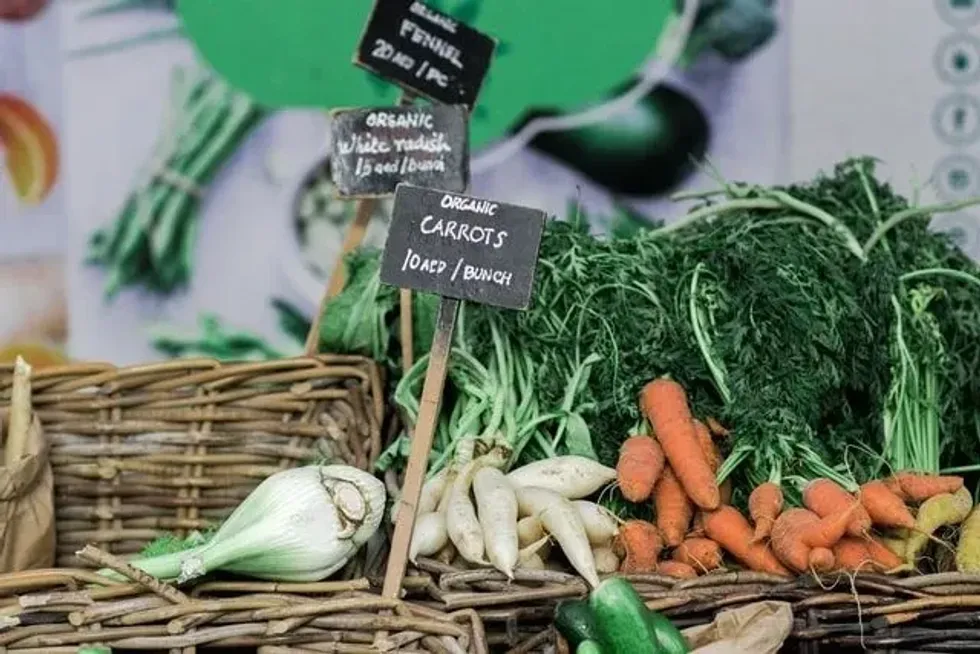53 Amazing Organic Food Facts To Amp Up Your Diet!

Why choose organic?
Organic food refers to products that are free from genetic modification, pesticides, and preservatives. Plus, it is highly beneficial for the environment!
In the 21st century, the demand for organic food in the global market is skyrocketing as more people are gradually shifting towards an environmentally conscious ecosystem. Modern farmers have become open to the practice of organic agriculture where emissions of greenhouse gases are considerably lower than food produced in conventional farms.
Already more than 2.5 million farmers have switched to organic, managing around 173 million acres (70 million hectares) of farmland. Moreover, food safety is a major factor that is responsible for boosting organic food sales.
Identifying Organic Food
Now, how do you identify organic foods? Organic products can be identified in several simple ways.
The quality of organic produce largely depends on farming techniques. Fruits and vegetables qualify as organic products only when they meet the standards laid down by the Organic Foods Production Act (OFPA). So, here are some significant details that will help you determine whether is product is organic or just local.
The OFPA came into force in 1990. It was introduced by Congress when the U.S. Department of Agriculture was required to define the national standards for food production.
The motto behind the introduction of the law was to ensure that people and institutions involved in growing and selling organic products abided by the regulations while engaging in organic farming practices.
Some of the standards laid out for crop production include the utilization of lands that bear no traces of prohibited pesticides, proper soil fertility management, manure dispersal, and implementation of prevention techniques for pest control.
Some livestock standards include providing organic feed to the animals, refraining from the use of growth hormones and plastic pellets, incorporating vitamins and minerals in their diet, and exposure to direct sunlight.
Standards for processing, packaging, and labeling are also followed before offering organic products for sale in the market.
While processing, certain additives are avoided. On the other hand, stringent packaging rules are applicable, which means that organic food cannot be packed in any kind of container that has traces of fumigants, preservatives, or synthetic fungicides.
Only a certified organic producer can be labeled 'organic' on its package.
One of the determining factors of an organic product is that it has to incorporate at least 95% organically grown ingredients. This is determined by ascertaining the total weight of the product minus the salt and water.
The most authentic way of identifying organic food is through lab testing.
How do you check the quality of organic food? This is where the appearance, size, shape, smell, and other factors come into play.
When dealing with organic fruits and vegetables, it should be remembered that the product won't be identical. The structure, color, and shape of any organic produce will differ because they are left unhampered during the farming or processing stage. However, one must steer clear of excessively shiny, bright-colored, perfect-looking products.
Another determining factor is that organic food, unfortunately, comes with a comparatively shorter shelf-life than processed food that contains weedicides and artificial pesticides.
Since no preservatives are used in the production of organic food, they don't last for a long time.
Aroma is a distinctive factor that helps in identifying organic spices as the spices emit a clear smell. Texture and flavor are other determining factors.
Generally, people tend to avoid grains, fruits, and vegetables that bear traces of insects. However, the presence of these little insects indicates that the grains, pulses, fruits, and vegetables haven't been adulterated with pesticides.
Before using these products, they can be rinsed with vinegar water or saltwater.
Since organic food is not adulterated with additives, the products are not too pleasing for the eyes. The fruits and vegetables exhibit a duller appearance as compared to the shiny and polished local ones.
Organic produce is irregular in shape and size too.
The Nutritional Value Of Organic Food
Nutritional value plays a significant role in ensuring a healthy lifestyle among people. The modern world is cautious and conscious of the nutrition derived from various fruits and vegetables as a part of their regular diet.
So, without any further ado, let's learn more about the nutrition offered by organic products contrasted against the nutrition derived from locally grown food.
Organic food is rich in vitamin C, phosphorous, magnesium, and iron.
Researchers believe that there's very little to zero difference in the nutritive value acquired from organically grown foods compared to conventional foods.
Although the nutritional content doesn't differ much between organic and conventional produce, it has been found that the pesticide content in conventional food is more than four times that of organic fruits and vegetables.
Although synthetic pesticides are avoided, farmers do make use of organic pesticides.
Pesticide residues in samples of organic products have been recorded at only 7% as opposed to 38% in the samples of locally grown food.
Studies show that organic kiwis and organic strawberries have more antioxidants and vitamin C content.
Organic blueberries projected a higher content of malic acid, phenolics, anthocyanins, fructose, and glucose.
The vitamin C content in organic oranges is 30% more than local oranges.

Organic Food Vs. Locally-grown Food
Today the food industry is dominated by fresh organic produce that is made directly available from farms. These foods include organic meats, fresh produce, and dairy products. However, the steady increase in organic food sales reveal that the market for locally-grown food is gradually diminishing. Therefore, the most significant differences between organic food and locally-grown food have been listed.
The emergence of organic food resulted as a counter to the Green Revolution.
Unlike the Green Revolution, where pesticides and improvised techniques of management are used for procuring a higher yield, organic farming focuses on sustainable methods of farming.
Laboratory tests have proven that organic food has nothing to do with enhanced taste when compared with conventional ones.
According to officials of the American Academy of Pediatrics, organic food is not directly related to lower risks of developing diseases or even a healthier lifestyle.
Detailed analysis and research on the long-term benefits of organic food as opposed to conventional food haven't yet been addressed.
Locally grown foods are not certified.
One of the most distinct differences between organically grown and locally grown food is that the production process of the former is far more expensive than that of the latter.
Sometimes, the cost of organic produce skyrockets to more than 50% when compared with local produce.
The most prominent aspect of organic food is that it is completely free from preservatives, pesticides, or any other kind of harmful synthetic additives.
Strong chemicals are used to eliminate unwanted organisms like worms from damaging conventionally grown food.
The use of pesticides is strictly forbidden in organic crops, so insects or their traces can often be spotted on organic vegetables, grains, or fruits.
Conventionally produced strawberries, peaches, celery, apples, cucumbers, spinach, lettuce, grapes, kale, potatoes, and other leafy vegetables have the highest pesticide content.
Conventionally produced sweet corns, avocado, pineapples, kiwi, eggplant, watermelon, mushroom, grapefruit, cabbage, and sweet peas have the lowest pesticide content.
The land requirement for producing conventional is drastically lower than organic food.
To produce only 0.2 gallons (1 liter) of milk, the land requirement is about 80% more compared to conventional milk.
Medical reports suggest that pregnant women who adopted a diet of local foods birthed children with lesser IQ levels due to the intake of harmful organophosphate pesticides.
Organic beverages have the largest market in North America among which organic milk is the most widely demanded beverage, along with tea.
Health Benefits Of Eating Organic Food
The soaring demand for organic foods in the international market is closely connected with the health benefits that they offer. Let's check out some of the benefits that organically grown foods provide.
Daily consumption of fresh foods from organic farms boost the overall health of the young and adults alike.
A balanced diet composed of organic foods is highly beneficial as these foods are enriched with antioxidants.
Cutting down on synthetic pesticides has advantages on one's health.
Organic food, like milk and meat, contains healthy fats that are essential for the body.
Consumption of organic food can reduce the chances of developing several heart diseases by improving the heart condition
One study reveals that organic food helps to build a stronger immune system.
Research shows that children who indulged in an organic diet had lower levels of pesticide in their urine.
The practice of using chemicals to get rid of pests or diseases is characteristic of traditional farming.
Since organic agricultural products are free from chemicals, they are safer for both children and adults.
A healthy breakfast should ideally be comprised of organic oats and organic apples rather than organic candies, organic deli cheese, or organic soda. You can also prepare an organic salad by mixing all of your favorite organic ingredients for a healthy and tasty meal.
FAQs
Is organic food really better for you?
Organic food is better in the sense that the nutrient content is comparatively higher than conventionally grown foods. This is because of the zero use of synthetic pesticides and additives.
Does organic mean pesticide-free?
Absolutely not. Organically grown foods use natural pesticides instead of synthetic ones. That's what makes a difference.
Why do people choose organic foods?
People choose organic food over locally grown food due to two major reasons. Some prefer organic food for its benefits to the health, while others choose organic to bring down the impacts of climate change and global warming.
How can you eat all organic?
There are many ways to incorporate more organic products in your regular diet. Storing organic food is an option, but since organic food cannot be stored for long, consuming seasonal produce is more viable. You can even visit your local organic farmers or grow your own!
Is natural food as healthy as organic food?
Organic food is a healthier option in the sense that these products have the certification and guarantee from the USDA regarding zero use of synthetic pesticides, herbicides, growth hormones, or antibiotics. On the other hand, there's no certification to prove that natural food is completely free from harmful toxins. However, there's a negligible difference in the content of nutrients.
Is organic meat good for you?
Organic foods like meat or cookies contain a good amount of fat and sugar, which can be damaging to your health. Organic meat doesn't imply that it is free from saturated fats, so it might not be the healthiest option.
How can I trust organic food?
Many people trust organic food simply because it contains labeling from the USDA only after meeting all of the food standards set by the Act.
How can you choose organic food?
It's very simple. You just need to read the food labels carefully to spot the 'organic' seal of the USDA. While choosing organic, make sure to pick fruits and vegetables that lack skin, because they are generally uncontaminated with pesticides.
What constitutes organic farming?
This farming technique constitutes increased food productivity, healthy food, healthy plants, as well as healthy soil that ultimately contributes to a healthy diet and healthy environment.
Is organic food healthier and safer for you?
Scientists are still indecisive about the long-term effects of organic food on health, but it is a much safer substitute of conventional food owing to the lesser presence of toxins. The nutritional quotient of organically produced food is quite comparable to the local ones, so it's not necessarily healthier.
What are the main features of organic food?
The defining features of organic food are minimal processing, natural texture, taste, no preservatives, and zero fertilizers.
Who eats organic food?
People from all walks of life incorporate organic food into their diet. Pregnant women, children, health fanatics, and affluent people of society are the major consumers. Since organic products are costly, people belonging to the lower-income strata cannot afford to go all organic.
Why is organic food popular?
As mentioned earlier, organic has gained immense popularity in the food industry owing to the health and environmental benefits that it brings along.
Is organic food sustainable?
The techniques of food production used in organic farms ensure sustainability in the fields of production as well as consumption. In terms of production, soil quality and the welfare of animals is prioritized in order to meet food production standards, thus contributing to a positive effect on the consumer's health.
What are the disadvantages of organic food?
Organic food is doubtlessly the best option when it comes to securing better health and an improved environment, but it also has some demerits. These foods are pretty expensive and cannot be afforded by all. They have a very short shelf life. Organic chemicals and organic pesticides are also utilized by organic farmers.
We Want Your Photos!
More for You
See All
Bachelor of Science specializing in Human Anatomy

Joan AgieBachelor of Science specializing in Human Anatomy
With 3+ years of research and content writing experience across several niches, especially on education, technology, and business topics. Joan holds a Bachelor’s degree in Human Anatomy from the Federal University of Technology, Akure, Nigeria, and has worked as a researcher and writer for organizations across Nigeria, the US, the UK, and Germany. Joan enjoys meditation, watching movies, and learning new languages in her free time.
Disclaimer
1) Kidadl is independent and to make our service free to you the reader we are supported by advertising. We hope you love our recommendations for products and services! What we suggest is selected independently by the Kidadl team. If you purchase using the Buy Now button we may earn a small commission. This does not influence our choices. Prices are correct and items are available at the time the article was published but we cannot guarantee that on the time of reading. Please note that Kidadl is a participant in the Amazon Services LLC Associates Program, an affiliate advertising program designed to provide a means for sites to earn advertising fees by advertising and linking to Amazon. We also link to other websites, but are not responsible for their content.
2) At Kidadl, we strive to recommend the very best activities and events. We will always aim to give you accurate information at the date of publication - however, information does change, so it’s important you do your own research, double-check and make the decision that is right for your family. We recognise that not all activities and ideas are appropriate for all children and families or in all circumstances. Our recommended activities are based on age but these are a guide. We recommend that these ideas are used as inspiration, that ideas are undertaken with appropriate adult supervision, and that each adult uses their own discretion and knowledge of their children to consider the safety and suitability. Kidadl cannot accept liability for the execution of these ideas, and parental supervision is advised at all times, as safety is paramount. Anyone using the information provided by Kidadl does so at their own risk and we can not accept liability if things go wrong.
3) Because we are an educational resource, we have quotes and facts about a range of historical and modern figures. We do not endorse the actions of or rhetoric of all the people included in these collections, but we think they are important for growing minds to learn about under the guidance of parents or guardians.







